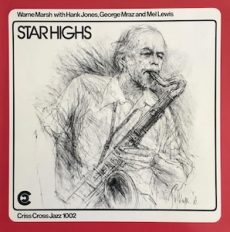
Requisites
Star Highs ~ Warne Marsh | By Eddie Carter
Warne Marsh enters the spotlight with Star Highs (Criss Cross Jazz 1002), an outstanding 1982 quartet album, his second release on the Dutch label. It was recorded two days after the tenor saxophonist’s performance at the NOS Jazz Festival in Amsterdam. Marsh, a talented musician who studied under pianist Lennie Tristano and later joined his group, is a notable figure in the Cool Jazz school. His collaborations with Lee Konitz and the jazz group Supersax have further solidified his reputation. He is accompanied here by the exceptional rhythm section of Hank Jones on piano, George Mraz on bass, and Mel Lewis on drums. My copy is the original Netherlands Stereo album.
The first side opens with Switchboard Joe, the first of four originals from the pen of Warne Marsh. The saxophonist guides George and Mel through a brief introduction to the quartet’s brisk theme. Marsh sets the tone with his opening statement, followed by a solo from Hank that answers him. Marsh then leads a brief conversation with George before the theme’s reprise. The ensemble then shifts to the title tune, Star Highs, starting with a relaxed groove for the melody. Marsh goes first with a beautifully constructed statement, followed by a concise comment from Jones leading to the closing chorus.
Hank Jones introduces his composition Hank’s Tune, a leisurely paced blues that gets into a happy mood from the quartet’s melody. Warne delivers the opening solo with a simplicity and melodic charm. Hank follows with a thoroughly delightful reading, and then George walks with a sense of fulfillment next. Warne gets the last word before the close. Charlie Parker’s Moose The Mooche gets underway with the quartet’s lively melody. Marsh takes off first with a robust opening statement, followed by Jones’s spirited solo. Mraz takes a short walk with authority. Lewis has the final say in a brief workout ahead of the climax.
Side Two opens to a brisk clip for the ensemble’s quick melody of Victory Ball by Lennie Tristano. Warne soars into the opening solo, with the rhythm section’s driving accompaniment. In the following interpretation, Hank is inspired to greater heights; then, Warne and Hank chase each other through the third reading. Lewis has a moment to shine before the theme returns. Marsh’s Sometimes starts with the trio’s tender introduction and a seductive lead solo by Jones. The saxophonist illustrates elegance and sensitivity in the second statement. Mraz rounds out the readings briefly, moving toward the gentle repeat of the theme.
One For The Band begins with a carefree theme. Warne takes the spotlight first, offering an endearing reading. Hank responds with a dreamy, satisfying statement before the quartet wraps things up. Gerry Teekens produced Star Highs, and Max Bolleman was the recording engineer. The album’s sound quality is superb, with a vibrant soundstage that emerges from your speakers as clearly as Waterford Crystal. Whether you’re a cool jazz fan or enjoy the tenor saxophone, Star Highs by Warne Marsh is a gem you should not miss on your next record-shopping trip. It’s a great introduction to a jazz giant that should appeal to any jazz lover and become a welcome addition to any library!
~ Moose The Mooche – Source: Wikipedia.org
© 2024 by Edward Thomas Carter
More Posts: choice,classic,collectible,collector,history,instrumental,jazz,music,saxophone


